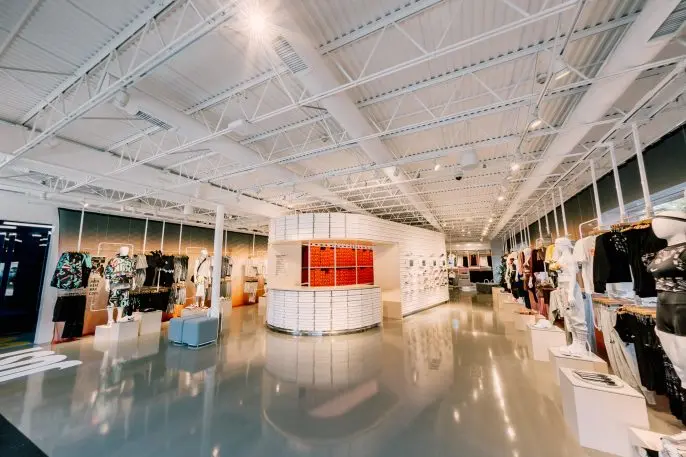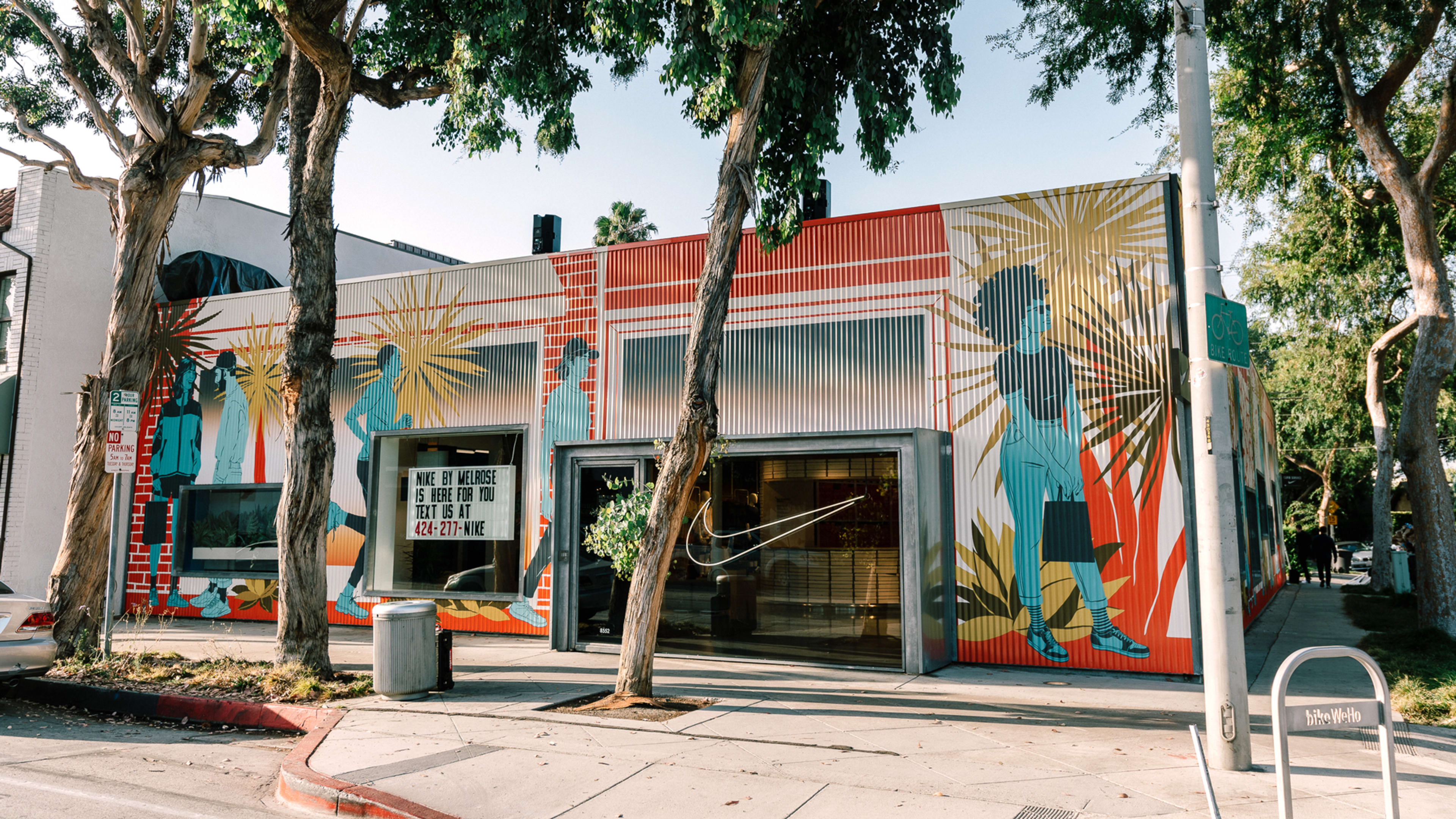Today Nike is unveiling its new concept store in the heart of one of Los Angeles’ famed shopping districts, “Nike by Melrose.” Yes, it’s on Melrose Avenue, but it’s also a statement of fact: The store was built by the people of Melrose. Everything about it–from its location to the products that it stocks–has been determined by data about how people from the area interact with Nike.
The company found, for instance, that one in fifty pairs of shoes sold in the area was a Nike Cortez, which was reflected in the product selection available to customers. By using data points like this to inform store selection, says Michael Martin, VP of digital products at Nike, the company is trying to create an agile and responsive store to “show and flow new products which will be rotated super fast, bi-weekly, into the stores so that customers can keep coming back.”
The 4,557 square foot single-level building in the heart of West LA is also the first Nike Live concept store that blurs the line between digital and physical shopping. Powered by Nike digital commerce data, everything about the store is designed to work seamlessly with the Nike Plus app on shoppers’ phones.
Although it’s just one store, it’s the consumer apparel giant’s latest effort to foster a more direct relationship with its customers and adopt a strong digital strategy at a time when brick-and-mortar third-party retailers that the company had previously relied on, such as Foot Locker and DSW, are floundering. Nike by Melrose is a testing ground for a more data-driven local approach that will influence how portions of planned flagship stores in New York and Shanghai will be stocked. Additionally, Nike is also looking to Melrose to pilot many of the features that will find its ways into all its stores around the world.

A personalized shopping experience
As soon as you enter the geofenced area, you receive app notifications with special offers. As Nike learns customer behavior through the app, it might reserve special items for you, whether you have requested them or not, “if we think you will be interested in a product based on our algorithm, we’ll reserve a pair of shoes in your name in your size for you to pick up,” says Heidi O’Neill, president of Nike Direct. “This kind of personalized mechanism online converts 40 times past any other mechanism Nike has in the field now,” she adds. “The store is the first time we can take that digital mechanic and apply it in a physical setting.”
Nike by Melrose is a dream for the socially awkward shopper, or anyone who hates interacting with sales staff. You can pre-order items on the app which will be placed in smart lockers in store that you’ll be able to open using a Nike Plus member pass. When you see a product you like in store, you can scan a code with your phone to request a different size and a salesperson will bring it to you immediately. Through the app, you’ll also be able to view more color options for the product, and see how much is left in stock. With Swoosh text (a messaging function within the app), you will even be able to text questions to store employees and get answers without speaking with them face-to-face.
Alternatively, if you want to speak with a store employee about how you run and the kind of shoe you are looking for, you’ll be able to get more face time with them via a Genius Bar-like service called Nike Express Sessions, bookable time slots via the app with employees who can help you find all the gear you want that you can then try out in the store’s trial zone. “We were trying to find a way for people to pick the way they interact using the app,” Martin says.
He says that the customer-interaction system came from what the team learned from a large-scale qualitative study that Nike conducted last year. “I have a background in entertainment and gaming products,” says the former NBC and Disney exec who joined Nike in 2016. “I used the method of emotional journey mapping and overlayed that over shopping journeys. The feature where people can scan and check shoe availability, for example, serves peaks of excitement in the shopping journey, to have that core shoe in your hand. That excitement can flip almost immediately into a negative when you start to wonder Is this the only color? Do they even have this in my size? So we want to eliminate that.”
A global strategy
Nike eventually plans to bring features from Nike direct to strategically important wholesale partners in an attempt to personalize Nike shopping experiences at third-party retailers as well.
The company, which has been embroiled in controversy over reports of a toxic workplace environment with several executives being forced out, has lately lost buzz to sportswear rivals like Adidas. According to market retail researcher NPD Group, Adidas nearly doubled its U.S. market share in 2017 from 6.3% in May 2016 to 11.3% in May 2017 compared to Nike’s 34.7% in 2017, down from 35.9% in May 2016, though the company’s earnings are up this quarter.
Nike previously rolled out a personalized shopping experience with its SNKRS app, specifically targeting sneakerheads, a small but influential segment of customers. Martin says that this group was generally more open to trying new experiences, so the company was able to test out features to see if a larger consumer base would like them.
With Nike Melrose, the company is introducing some of those features to a wider audience. “As we are becoming a real experiential digital commerce leader, we’re going to become a physical commerce leader,” O’Neill says. “Consumers 80% of the time are using a store experience to inform a digital purchase or the other way around.”
The app ecosystem will be fully effective, O’Neill says, “when we get it right, when we’re able to use the data to help our customers. We can really motivate them. We can pick both a run and the right running shoe for them. We want to take them from being just consumers to Nike members.”
Recognize your brand’s excellence by applying to this year’s Brands That Matter Awards before the early-rate deadline, May 3.
